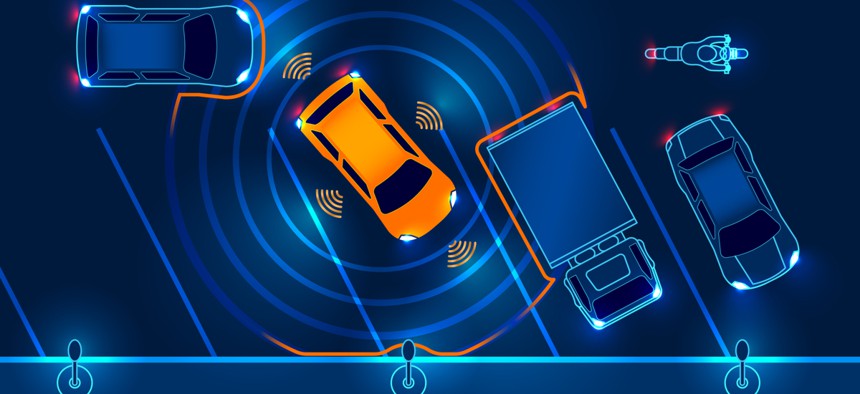Transportation Challenge Aims to Create Universally Accessible Automated Vehicles

Andrey Suslov/Shutterstock.com
The agency plans to award up to $5 million in prizes.
In contemporary production, most passenger vehicles are generally not equipped with universal accessibility features that make it easy for people in wheelchairs or with other disabilities to use them. But the Transportation Department aims to incentivize more inclusive solutions in the impending wave of next-generation travel and the highly-anticipated introduction of automated vehicles that require little or no human interaction.
According to a request for information set to be published in the federal register Tuesday, the agency wants feedback on its plans to host an Inclusive Design Challenge to spur innovation that’ll enable riders with a range of disabilities to access automated vehicles upon production, instead of attempting to retrofit solutions in the aftermath.
“The Challenge will solicit solutions addressing obstacles faced by persons with physical, sensory, and/or cognitive disabilities,” officials said in the RFI. “The goal of the Challenge is to inspire inclusive designs as AVs are developed, which may also increase access to conventional vehicles today.”
A recent brief from the Transportation Statistics Bureau highlighting the travel patterns of adults with disabilities suggests that more than 25 million Americans ages 5 and older have self-reported travel-limiting disabilities. Of those, more than 3 million Americans reported barely leaving their homes due to their disabilities. Through the new multi-phase prize competition, the agency is making up to $5 million available to innovators around the nation who seek to create new, feasible technological solutions that tackle widespread issues around vehicle-access. Transportation emphasizes that it is not yet accepting applications for the competition, but instead launched the RFI for feedback on its strategy and plans for the Challenge. The agency originally unveiled plans for the competition in October at an Access and Mobility for All Summit but offers more details about the effort in the new solicitation.
Automated vehicles are expected to help usher in an era where people with disabilities can move around more independently. The agency is looking for solutions that will support diverse disabilities and needs through novel vehicle designs, as well as independent components that will bolster inclusive design features. Inclusiveness will be reviewed based on the solutions’ ability to address one or more vehicle-use tasks that people with disabilities need to complete on their own, including: locating, entering and exiting the vehicles; securing passengers and their mobility equipment, inputting information around passenger identities; inputting destinations and requesting needed assistance; and engaging with the automated vehicles in both routine and emergency situations. Transportation also expects project teams to identify representatives from both industry and the disability advocacy community to help inform and advise on their ideas and approaches throughout the process.
“[The agency] expects teams to describe how they have engaged with stakeholders to understand the needs and constraints of both industry and travelers with disabilities when explaining the feasibility and impact of their design,” officials wrote.
The Challenge will be structured in two stages. In the first, eligible designers will submit their proposals of the inclusive disability-friendly design solutions they aim to produce. Up to 15 semi-finalists will receive $100,000 each to develop their promising concepts. From there and in the second stage, they’ll be expected to create functional prototypes and demonstrate their solutions’ viability. Up to four of those designers will be chosen as finalists and receive a portion of the remaining funds, which include a potential grand prize of $2 million.
In the RFI, Transportation asks interested participants to weigh in on the topic, its approach and plans for the design challenge, as well as its evaluation criteria. Comments will be accepted through the federal regulations website and via email until 5:00 p.m. on Jan. 31.






